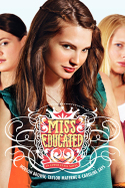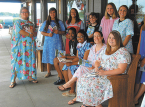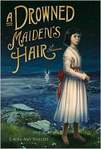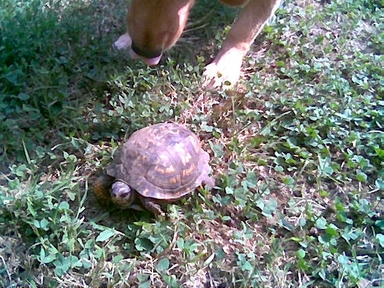It seems somehow fitting that Colleen brings up the issue of class in middle grade and young adult fiction on the day that we learn Michael de Larrabeiti has died. The Borribles trilogy, of course, is a brilliant study in fictional class warfare, so much so that even his obituary in The Independent discusses this at length:
The plummy voiced Rumbles, who habitually pronounce "really" as "weally" while lacing their dialogue with phrases like "old bean" and "frightfully sorry" are equally horrible, but without the raging envy that make the Borribles such dangerous enemies. Loyal to each other and to the traditional cockney area where they live, the Borribles see changes happening in front of them that echoed the social revolution actually happening in Battersea and other formerly working-class districts during that time. A dark and subversive urban amalgam of Richmal Crompton’s "William" stories, J.M. Barrie’s Peter Pan and J.R.R. Tolkien’s The Hobbit, the novel proved an unexpected critical hit both in Britain and in the United States. But getting it into paperback took some time, with publishers still nervous about a possible public backlash.
In preparation for my first residency in the MFA program, they sent us a reading list with a bajillion book s to read before a survey lesson on the history of children’s lit. Ramona and Her Father was on the list, and struck me greatly because, as I put it in this entry at the time: "This is the one where her father gets laid off from his job; eventually, at the end, he gets a new one as a check-out cashier. I can’t remember the last time I read about a real blue collar family like this, where it was portrayed as okay and a non-issue to not be the Joneses."
s to read before a survey lesson on the history of children’s lit. Ramona and Her Father was on the list, and struck me greatly because, as I put it in this entry at the time: "This is the one where her father gets laid off from his job; eventually, at the end, he gets a new one as a check-out cashier. I can’t remember the last time I read about a real blue collar family like this, where it was portrayed as okay and a non-issue to not be the Joneses."
And I do think its true that we don’t see this so much these days in books for kids (or books for adults, for that matter). What would S.E. Hinton’s The Outsiders have been, without the class issues? One of the things I loved most about the first season of Veronica Mars was how it played with these same issues. And, yet, in the following seasons that dynamic became so muted it nearly disappeared altogether.
It makes me wonder if this if this isn’t a result of the poor or slightly-less-poor being edited out of our larger cultural narrative. You see this in the political seasons too, right? Where everyone, regardless of their economic status, is convinced by a certain party that doing away with estate taxes, and etcetera, is really in their best interest. I’m hopeful we won’t see that this cycle, because so many people who vote really are hurting, but hopeful isn’t the same as convinced. Class is always an undercurrent, but it is rarely engaged with in a direct and honest way.
There’s a New York Times article today about the proliferation of brand books packaged as chick lit, contrasting them with Truman Capote’s Breakfast at Tiffany’s. And the discussion that touched off Colleen’s post started by talking about the YA corollaries to this like Gossip Girl. I’ve been trying recently to become better read in a couple of categories that get carelessly denigrated–one being chick lit-packaged YA and the other paranormal romance/urban fantasy. Having looked at some of the better books? It shows that the people talking about these often haven’t bothered to read them.
Being a little obsessed with the omniscient narrator in young adult fiction, one of the things that got me to read Gossip Girl was discovering that it had one. And, it’s true, that as one of the adult authors in that NYT article says, these brandful books seem to work best when the authors in some way "acknowledge that they are in on the joke." The omniscient narrator provides the distance necessary to do that, and you do get that at least in the first few Gossip Girl books (the only ones I read; though I did often feel the narrator’s distance came across more in time–an older version of one of these girls, perhaps–than in background or offering much social critique). Given the dearth of omniscient POV in young adult works by Americans, it’s particularly notable that the series I just read the first three books of, The Upper Class–written by three former prep school classmates, Caroline Says*, Hobson Brown, and Taylor Materne–also uses this POV as a device, but to a more nuanced end than in the Gossip Girl books. (And with far better prose and far less brand-dropping, it must be said. I highly, highly recommend these novels.)
The Upper Class books are interesting for what they aren’t. They utilize the native glamour of th e ultra-rich teens to show how their lives often aren’t very glamourous, especially from the inside. One of the neatest tricks the series pulls off is to honestly portray the life of the privileged rich kids in a way that makes it clear how universal many high school experiences actually are. (I grew up firmly middle class in a supersmall town and, boy, did I go through a lot of the same stuff these fictional rich kids do, just in a far different milieu.) These are also well drawn, believable characters–stereotypes reinvented as human beings, something the best teen stories set in schools have always done. Never once reading these books did I forget there was a wider world out there, with people living with far less than most of these characters, and that’s a credit to the writing. To suggest that wealthy characters need always be cast as morally bankrupt villains–and there was plenty of that in ye olde days, for sure–is to miss the point. (Justine Musk has an excellent real-life post on similar issues today, in response to a troll. We ignore the rich at our peril, right? Characterizing them in a thin way does us no favors in terms of understanding them or their impact on the larger society, which can obviously be huge.) If there is a moral to take from this entire semi-genre of books–based on what I know about them, so I could be wrong–it would be closer to: Being rich doesn’t necessarily make you happy**. That’s actually a good thing for kids to know, right?
e ultra-rich teens to show how their lives often aren’t very glamourous, especially from the inside. One of the neatest tricks the series pulls off is to honestly portray the life of the privileged rich kids in a way that makes it clear how universal many high school experiences actually are. (I grew up firmly middle class in a supersmall town and, boy, did I go through a lot of the same stuff these fictional rich kids do, just in a far different milieu.) These are also well drawn, believable characters–stereotypes reinvented as human beings, something the best teen stories set in schools have always done. Never once reading these books did I forget there was a wider world out there, with people living with far less than most of these characters, and that’s a credit to the writing. To suggest that wealthy characters need always be cast as morally bankrupt villains–and there was plenty of that in ye olde days, for sure–is to miss the point. (Justine Musk has an excellent real-life post on similar issues today, in response to a troll. We ignore the rich at our peril, right? Characterizing them in a thin way does us no favors in terms of understanding them or their impact on the larger society, which can obviously be huge.) If there is a moral to take from this entire semi-genre of books–based on what I know about them, so I could be wrong–it would be closer to: Being rich doesn’t necessarily make you happy**. That’s actually a good thing for kids to know, right?
We shouldn’t dismiss books that focus on well-to-do characters out of hand; it’s abundantly clear to me why teens respond to such books, and I don’t believe for a second that they are reading them irony-free. The vast majority of characters in middle grade and YA fiction seem to inhabit a middle class where income isn’t really a topic of discussion at the dinner table, and I think what I’d like to see is how anxiety about class bleeds into real life more, and more characters for who the dinner table and what’s on it is a great anxiety itself. After all, in the books about the rich kids, the influence of wealth on their lives is front and center, which strikes me as more honest than the alternative, where economic situation is barely worth a mention.
Basically, I want more Ramona and Her Father, more first season of Veronica Mars (more Gas, Food, Lodging!). (Yes, I’ll stop being annoying and mentioning movies and TV now.) (From a money-where-your-mouth-is perspective: Yes, while one of the novels I’m working on features mainly middle class teens***, the other features ones living on–er, beneath–the streets. I’m finding they can fight dragons just as well as their more well-to-do cousins can fight government corruption.)
Colleen hits on this in her post, so I’ll just quote her to finish:
There are certainly some excellent books out there today that reflect the current economic situation for the majority of Americans (and I will be posting on some of them next month), but there are not nearly enough. That is what we should be talking about.
*A pseudonymous adult novelist, as well. And here’s another excellent interview with her, where she talks about point of view.
**I still firmly believe that it would make me even happier than I already am, if such a thing is possible.
***One of the main character’s friends is obscenely wealthy, and that friend has a lot of crap to deal with because of it.
 Our local paper has a great story today about a rural Kentucky high school book club called the "Moo Moo Club" because they wear muumuus when they meet in honor of a photograph of their favorite teacher wearing one. A couple of excerpts, because this story makes me very happy:
Our local paper has a great story today about a rural Kentucky high school book club called the "Moo Moo Club" because they wear muumuus when they meet in honor of a photograph of their favorite teacher wearing one. A couple of excerpts, because this story makes me very happy:


